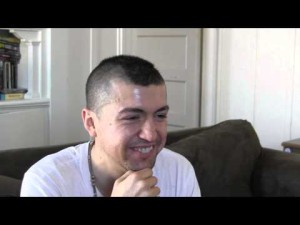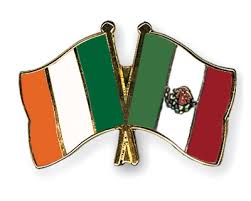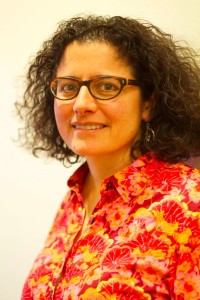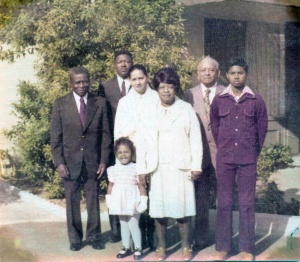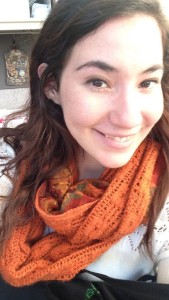Dylan Amaro-McIntyre is a reformed former misanthrope who finds beauty in the details because the big picture terrifies him. He draws words and writes pictures. He also writes poems, sometimes well. He has been published in various poetry collections and has been featured as a performer at well known venues throughout the Bay Area. On Thursday nights he binge eats peanut butter; he recently discovered Macadamia butter and it is ruining his life.
[youtube]www.youtube.com/watch?v=cycp1-6yYFc[/youtube]
Taking part in the “You don’t look Irish!” panel: Clare Ramsaran, Caroline Mar, Dylan Amaro-McIntyre, and Stephen Murphy-Shigematsu on March 27th 2015
Caroline Mar – mixed race poet
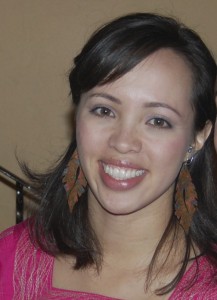
Caroline Mei-Lin Mar was born and raised in the Bay Area. Carrie is a queer mixed-race Chinese-Irish femme who was raised to cause trouble by her radical lefty parents (her first childhood St. Patrick’s Day parade participation involved staging a pro-IRA “die-in”). She currently works as a secondary Special Education teacher and owes great gratitude to her students and colleagues for what they teach her every day. A recent graduate of the MFA Program for Writers at Warren Wilson College and an alumna of the Voices at VONA workshop, Carrie is seeking publication of her first book, Special Education. Her poems have been published in The Collagist, Shadowgraph, As Us, and others.
Taking part in the “You don’t look Irish!” panel: Clare Ramsaran, Caroline Mar, Dylan Amaro-McIntyre, and Stephen Murphy-Shigematsu on March 27th 2015
Clare Ramsaran – mixed race writer
I’m very happy to be part of the “You don’t look Irish!” panel, in March in San Francisco. Here’s the biography I submitted for the festival brochure:
Clare Ramsaran was born and raised in England, but checks “other” on forms when asked to define her heritage – or creates her own category of “Indo-Guyanese/Irish”. 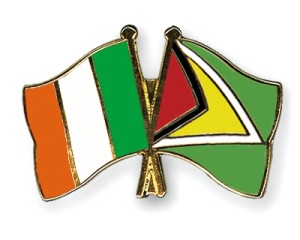
She is an alumna of the VONA Voices workshop and is an MFA candidate at the University of San Francisco. She is currently working on a novel about two Caribbean brothers who join other young immigrants to London in their pursuit of love (of the inter-racial and queer varieties) and justice. She blogs for Mixed Remixed and her writing has been published in anthologies in the USA and England, and in journals including the St Sebastian Review. Visit her blog at: clareramsaran.blogspot.com
Family Album: A Mixed Remixed Family Story
I met Audrey Esquivel at a writing workshop at the Mixed Remixed Festival earlier this year and our paths crossed again at a reading back in the Bay Area. When she shared a family photo on Facebook it seemed the ideal subject for a blogpost. So I asked her to use the photo as a writing prompt and here’s the result.–Clare R.
Text by Audrey Esquivel:
The year is most likely 1976, as I seem to be around 2 years old. We are standing in front of the townhouse where my brother and I lived with our parents in Oceanside, California. I have on my church dress and gloves, so the photo was taken on a Sunday, probably just after returning from Sunday morning mass.
It was the first, and maybe the only, time my father’s dad, Grandpa Rueben, flew in an airplane. Dad’s parents lived in Harvey, Illinois just outside of Chicago. Once Grandma Flora said she was going, Grandpa Reuben got over his fear of flying rather quickly.
My mother’s parents, Granma Dot (aka Granny) and Grandpa Joe, had recently immigrated to the US from Burma and were visiting us after driving up from San Diego where they were living with my Aunt Rita and her family.
This picture is meaningful to me for many different reasons. My brother and I are the only two people in this picture who are still alive. This is the only picture of my brother and I with all four of our grandparents.
However, what stands out most to me when I look at this picture is that it captures and represents the full extent of my knowledge of my father’s family lineage.
As I go through my mother’s family photo albums I uncover pictures that were taken in the 1800s. There are photographs of my mother with her grandmother, of her grandmother as a young woman, of her grandmother as a baby, even photos of my great-great-great grandparents. There are also written records of my mother’s family tree dating back several generations to when her European ancestors first arrived in Burma.
As for my father’s heritage, I know that my Grandma Flora’s maiden name was Whitaker and they were from Arkansas. In terms of tracing the roots of my African-American family tree, that is all I know.
You don’t look Irish!
I’ve been attending the wonderful Crossroads Irish American Festival in San Francisco for a number of years. My mother is Irish and I have happy memories of going to Ireland during the summer when I was a child, to visit my grandmother and other relatives.
After one of the readings at the Crossroads Festival, my friend, poet Pireeni Sundaralingam, introduced me to one of the organizers, Hillary Flynn. When I mentioned that I was a writer of South Asian and Irish heritage and that I knew a number of other writers who were mixed and Irish, an idea formed. Wouldn’t it be great, we thought, to have a panel of writers of mixed/Irish heritage as one of the events at the Festival.
Well, lots of conversations, phone calls and emails later, we are doing exactly that! I approached writers from the Mixed Remixed network (thanks Heidi!) and from the VONA (Voices of Our Nation Arts) Writers network to join me for an event called: “You don’t look Irish!” A Reading And Conversation with Multiracial Writers of Irish Heritage”. It will take place on March 27th in San Francisco at the University of San Francisco – where I’m a candidate for an MFA in Creative Writing.
 If you are in the area (or would like to come to the area!) please come and listen to: Dylan Amaro-McIntyre, Caroline Mar, Stephen Murphy-Shigematsu, and Clare Ramsaran, four very different writers and join in the conversation about what Irish heritage “looks like” in the 21st Century.
If you are in the area (or would like to come to the area!) please come and listen to: Dylan Amaro-McIntyre, Caroline Mar, Stephen Murphy-Shigematsu, and Clare Ramsaran, four very different writers and join in the conversation about what Irish heritage “looks like” in the 21st Century.
Location: Maraschi Room, Fromm Hall, University of San Francisco, 2130 Fulton Street @ Parker Street (next to St. Ignatius Church), San Francisco, CA.
Cost: Free. Donations welcome.
Mixed Britannia
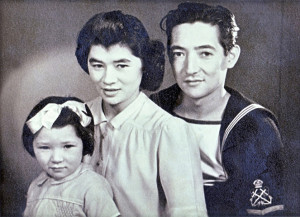
BBC
Last time I visited England, my sister had recorded a series called “Mixed Britannia”. I sat down with my sister Yvonne (Indo-Guyanese/Irish – like me!), my niece Roxana (Indo-Guyanese/Irish/Iranian) and we binge-watched programmes about multi-racial Britons, like us (and not like us). I felt moved and proud to hear people’s stories and to feel that my story was connected to theirs.–Clare
[youtube]https://www.youtube.com/watch?v=7VNtLEAt6AU[/youtube]
It’s wrong to judge me by my pigment!
Introducing San Francisco-based poet Carina Aguirre, and her poem written during the “Poetry and Poverty” course at the University of San Francisco.
A man came up to me
He said
Girl you the prettiest white girl I ever seen
It was wrong cause that’s all
he could see — leering at my sexuality.
It’s wrong to judge me
By my body type
Cause it’s all hype
It’s wrong to judge me by my pigment
Cause that’s just a figment, of society’s warped up stereotype
He had it all wrong
His vision of me
Isn’t who I am supposed to be
Because I’m brown — Mexican to be exact
That’s just a fact
But I’m more than that.
If you get down to it
those grapes in that wine you sippin’ on
Were picked by the hands of my fathers and mothers
Blood sweat raw flesh
mixed in with those fresh
Fruits, picked for pennies a pound
poisoned with pesticides in the ground.
So respect my people by respecting me
those hands, those souls that feed
you with cheap labor, and die trying
to be here, in a country that still
will try to kill
their opportunity for a better life
so they won’t have poverity strife
So stand back cause I know who I am
And now I need to make it known
That I got a mind not just a body
I got a name and it ain’t hottie
C A R I N A is how you spell it
I am a woman – a proud Mexican
Believe it
Don’t trip
Get it down tight
Cause you’re wrong, and I know I’m right.
-Carina Aguirre
What would you do if Barack came in?
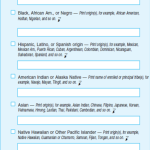
The sun was hot and the sky a bright Mediterranean blue, but when I reached the US Citizenship and Immigration Services building it was grey and flat, and seemed to absorb the metallic light.
Behind the counter an older Asian woman filled in a form for my ‘biometrics appointment’, she glanced at me and circled ‘Asian’ as my ethnicity. Officials usually choose ‘white’ while I choose, or write in, ‘mixed’. I imagined the scenario – my application delayed because my ethnicity suddenly changed half way through the process. San Francisco is truly a town of transformation, you can change your gender, your sexuality and even your football team, but your ethnicity? I don’t think so.
I ask her to circle ‘white’. She did so and erased ‘Asian’. I explained I’d like both categories and she said ‘No, you have to choose one’… ain’t that the truth! I smiled and asked, ‘what would you do if Barack came in?’ gesturing towards the President’s photograph on the wall behind her. She remained unsmiling and I remembered the ‘birthers’ thinking maybe it wasn’t such a good question after all.–Clare
“No Colour Bar” Dance – London 1955

“No Colour Bar” Dance – London 1955
I’m carrying out research for my novel about Caribbean and Irish immigrants to London, England (like my parents). I came across some interesting videos including this Pathe report from 1955. It features a dance in London where the Mayor of Lambeth (one of the London Boroughs) invited 180 “English” people and 180 “West Indians” to a dance, in order to improve relations between the existing population and the newer immigrants from the British Caribbean.–Clare
Princess Jazz and the Angels
Having a Sikh father, Irish mother and living in Scotland, Jazz wonders where she belongs. Her father has been killed and when her mother can’t cope Jazz is sent to stay with her father’s relatives in the Punjab. It’s a hard adjustment to accept and it takes the ‘Haggis-Indian’ doctor, Elspeth, to help her understand the richness of belonging to more than one place. Their exchanges, in exuberant Scottish dialect, set in a Punjabi hospital, are the start of a wonderful bridging between cultures and people. This book is short, powerful and moving. (Info from booksforkeeps.co.uk)
http://booksforkeeps.co.uk/issue/95/childrens-books/reviews/princess-jazz-and-the-angels
